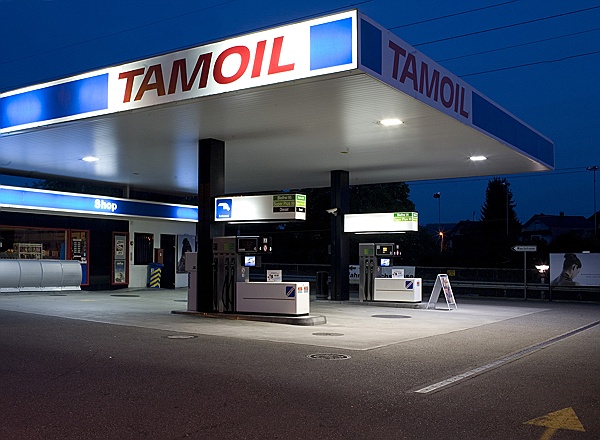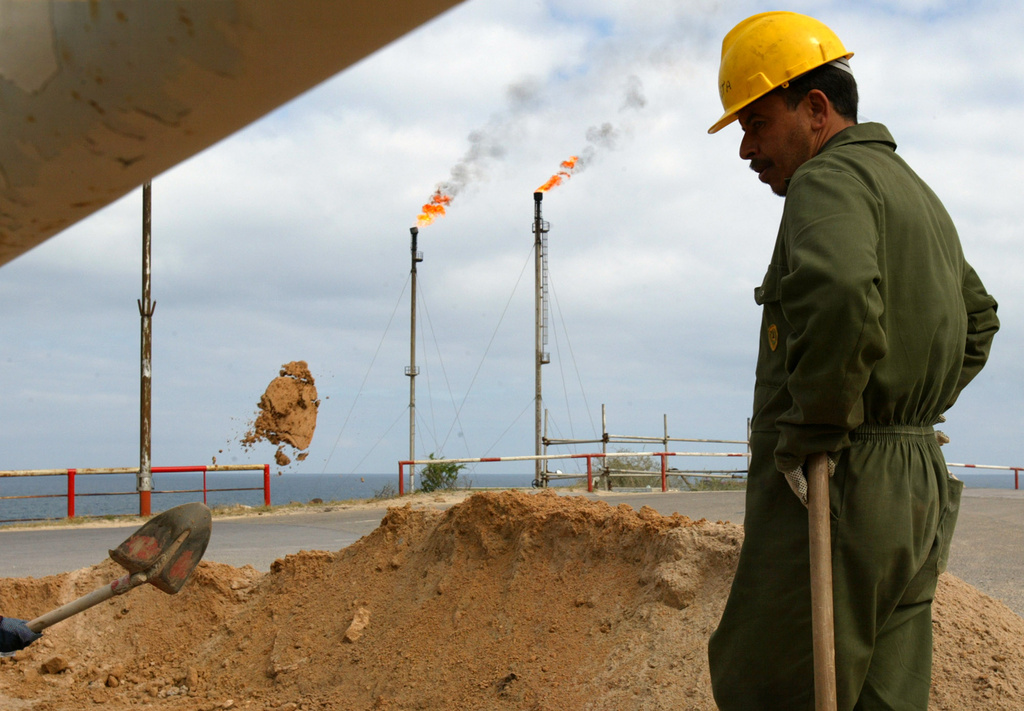Tamoil issue fuels debate in Switzerland

Switzerland’s best known oil refinery and the country's extensive network of Tamoil filling stations could be targeted by the next round of sanctions against Libya.
The Collombey refinery in canton Valais and the petrol stations are part of the Dutch-based Oilinvest group, which belongs to the Libyan Investment Authority (LIA).
Although the LIA belongs to the Libyan state, and its purpose is to invest money for the good of the country as a whole – as a sovereign wealth fund – it is widely believed to be controlled by Libyan leader Moammar Gaddafi and his regime who draw on its receipts for their own purposes.
It is therefore affected by the United Nations resolution passed on February 16, calling on all members to freeze assets on their territories which are owned or controlled, directly or indirectly, by members of the Gaddafi regime.
Switzerland already froze the personal assets of Gaddafi and his entourage on February 24. The Swiss State Secretariat for Economic Affairs is currently looking into how to apply these wider UN sanctions in Switzerland, including the Tamoil issue. Media reports say the cabinet could make a decision on Friday.
Carlo Sommaruga, a centre-left Social Democrat parliamentarian, has called – independently of the UN resolution – for Tamoil transactions to be frozen straight away.
“There is a legal basis in Switzerland to allow the government to take emergency steps to protect Swiss interests,” he told swissinfo.ch.
In Swiss interests
Switzerland should ensure that it cannot be suspected of allowing money to be paid to Gaddafi or his entourage, since it could be used to buy weapons for use against the people, he said.
“It is clear that the money belongs to the Libyan people,” he added.
Sommaruga says Switzerland should set out very clearly its conditions for accepting funds from “politically exposed persons” [persons with a prominent public function, and their relatives] or states where there are human rights issues.
“Switzerland cannot accept funds from regimes which do not accept democracy and respect for human rights at the same time as we are promoting these values internationally.”
The country should set new criteria such as the extent of democracy in the investing country, he added. At the moment, the only grounds for turning down investments are that they should not be used for money laundering or for financing terrorism.
Senator Dick Marty has said in a Blick newspaper interview that sovereign wealth funds from authoritarian regimes should not be invested in Switzerland.
Tamoil impact
Tamoil spokesman Laurent Paoliello told the Reuters news agency on Thursday that the group was waiting to see how UN sanctions could affect its work.
He said that Swiss and European Union sanctions had not had any impact on operations. But the Collombey refinery is already running at reduced rates and using reserve stocks because of high oil prices and low margins. He warned that it might have to close temporarily if prices remained high.
Collombey processes 15-20 per cent of the oil used in Switzerland, Rolf Hartl of the Swiss Oil Association told swissinfo.ch.
Since the crisis sparked by the brief detention in Geneva of Gaddafi’s son Hannibal in 2008, very little of the oil processed there has come from Libya. The exports, which started dropping with the outbreak of the unrest in February, have now stopped completely, he said.
Hartl says prices will go up, but Europe will be able to make up the shortfall from other sources. The current Libyan regime will be hit much harder.
“If no more oil can be exported for any length of time, Libya, and Gaddafi in particular, will dry up financially,” he said.
“It is not so much the turnover from Tamoil that counts here, but the sales of oil and gas,” he explained.
Swiss not alone
Switzerland is not likely to take steps against Tamoil alone. “If it happens, all the European states where Tamoil operates will have to be involved. It would have to be a coordinated move,” said Hartl.
And since Tamoil is part of a holding that legally belongs to the Libyan people, its operations on the ground must not be compromised, he pointed out.
Daniel Senn, head of financial services at KPMG in Zurich, told swissinfo.ch that Switzerland legally had to follow when the UN imposed sanctions.
He does not believe that the Swiss Tamoil freeze would discourage other countries with sovereign funds from investing in Switzerland.
Switzerland would be acting along with the international community. “And after all, sovereign funds have to invest their money sensibly somewhere.”
Tamoil Switzerland had a turnover of SFr2.7 billion ($2.9 billion) in 2009, which, according to its website, makes it the number one petrol company in Switzerland. It has been in the country since 1990.
It has around 1,500 employees and there are 324 Tamoil petrol stations in Switzerland. The oil company sponsors various local sports teams in the country.
The firm and its refinery at Collombey in French-speaking Switzerland are part of Oilinvest BV, a Dutch-registered company.
This is in turn is part of the Libyan Investment Authority (LIA), which is close to the Gaddafi clan. Tamoil’s Libyan connections are not mentioned on its Swiss website.
The Libyan Investment Authority (LIA) is estimated to have up to $70 billion invested worldwide.
It is one of the most opaque sovereign wealth funds in the world, with strong links to the government. In a rare annual report in 2009 it said it had more than 78 per cent in “short-term financial instruments abroad”.
The authority worked to enhance Libya’s credibility on the international stage by acquiring stakes in European bluechip firms, including Italian bank Unicredit and British publisher Pearson, owner of the Financial Times newspaper
In a confidential diplomatic cable obtained by WikiLeaks, Mohamed Layas, head of the Libyan Investment Authority, said several US banks were each managing up to $500 million of the fund’s money.

In compliance with the JTI standards
More: SWI swissinfo.ch certified by the Journalism Trust Initiative












You can find an overview of ongoing debates with our journalists here . Please join us!
If you want to start a conversation about a topic raised in this article or want to report factual errors, email us at english@swissinfo.ch.